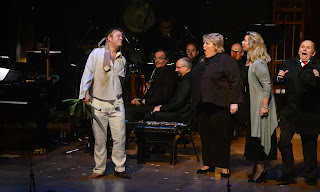 |
| Albert Herring, act 2 - Copyright: BBC/Mark Allan |
The performance was billed as semi-staged, but it was for more than that. The instrumental ensemble was placed upstage centre, with two acting areas either side. Stage left was the Herrings' shop, complete with a shop door and a table of fruit and vegetables. Stage right was Lady Billows's house, becoming the venue for the fete in act two. Perhaps most importantly, the cast were all off the book (many having sung their roles in other productions) and Kenneth Richardson's production was lively, inventive and sympathetic. The cast were in modern dress, generally in character with Christine Brewer's Lady Billows resplendent in three different stylish outfits complete with some magnificent jewellery.
The advantage of the performance was that it put the orchestra centre stage, giving us the chance to appreciate the brilliance and imagination of Benjamin Britten's orchestration (12 players including a piano played by the conductor).
Albert Herring is a very traditional comedy and wisely Kenneth Richardson chose to respect this. Except for Andrew Staples' drunken scene in act two (a lovely piece of staging), the cast ignored the orchestra and behaved as if it wasn't there. Albert Herring is very much an ensemble opera and despite having done it on presumably minimum rehearsal and many being distinguished enough to receive top billing in their own right, the cast did very much create a feeling of ensemble and were clearly enjoying themselves.
 |
| Andrew Staples, Christine Brewer, Gaynor Keeble, Adrian Thompson: Albert Herring - Copyright: BBC/Mark Allan |
 |
| Marcus Farnsworth, Kitty Whately, Andrew Staples: Albert Herring - Copyright: BBC/Mark Allan |
Britten intended Lady Billows to dominate, writing the character in a way which resonates through the scenes when she is absent. She starts off stage and much of the action is articulated by the force of her personality. The role has been sung by a variety of sopranos. I have heard sopranos as diverse as Pauline Tinsley, Catherine Wilson, Felicity Lott, Rita Cullis and Jennifer Rhys-Davies, to which can be added Janis Kelly and Josephine Barstow - quite a diverse list. But the role was written for Joan Cross, a soprano who had sung Wagnerian roles, and it shows. Whilst lighter voices can manage, we are best when the soprano can quell a room with a look and a note. So far, the finest Lady B that I had seen was Pauline Tinsley, and Christine Brewer was definitely in this class. She gave a commanding performance with the combination of flexibility and power, plus a nice relish for the humour or the role. Christine Brewer's voice still has the remarkable facility for movement, and though one or two notes above the stage were a bit crucial, this was in character. She was able to go from softness of phrasing to cutting through the whole ensemble.
The festival committee were all beautifully characterised and finely balanced, with some very luxury casting. Gillian Keith was a fluttery, nervous and very stylishly dressed Miss Wordsworth and a complete delight in the role's rhapsodic, coloratura passages. Adrian Thomas was a rather over the top Mr Upfold. Roderick Williams sang Mr Gedge's solos so finely that he completely defused the character's sententiousness. And Williams's Gedge was clearly very smitten with Keith's Miss Wordsworth. Matthew Rose was a complete delight as Mr Budd. Gaynor Keeble was perhaps more glamorous than some as Florence Pike, but she sang with great character, firmness and voice. She elicited great sympathy for having to work for a character like Lady B, but also had a delightful feel for the sheer prurience of the character. This prurience came out in the glorious final scene when all the committee insisted on Albert telling them exactly what he had done.
Catherine Wyn-Rogers was a finely judged Mrs Herring, less technicolour than some performers. A rather sallow, put-upon character with an alarming taste in best clothes, but with Wyn-Rogers familiar intelligence approach and warmly rounded tones.
The three children made a lovely trio, working well together and producing some perfectly delightful and nicely quirky characterisation.
Under Steuart Bedford's careful eye, the instrumental ensemble made an almost extra character in the drama, imaginative and vivid. This was a brilliant, characterful and very funny account of Britten's opera. A fitting tribute to the composer on his centenary.
Elsewhere on this blog:
- WIN a copy of Music: The Definitive History our latest Competition
- Opera or Oratorio - Philip Glass's Satyagraha at ENO
- Second view - Mozart's Magic Flute at the London Coliseum
- Britten - Sacred Choral Music - Choir of New College, Oxford - CD review
- Les Chevaliers de Saint Hubert in Jacques-Francois Gallay
- Britten - Canticles - Konstellation
- An encounter with the Hermes Experiment
- Britten at Temple Church
- Phoenix Rising - Stile Antico at Cadogan Hall
- Diversions beyond the Snowman, an encounter with Howard Blake
- Remarkable achievement - John Sheppard sacred works - Choir of St John's College, Cambridge - CD review
- An encounter with the young conductor Harry Ogg
- Home



%20in%20The%20Merry%20Widow.%20Credit%20Mihaela%20Bodlovic.%20(2).jpg)

%20in%20Trial%20by%20Jury.%20Credit%20Mihaela%20Bodlovic..jpg)

%20Britten%20Pears%20Arts%20(1).jpg)




No comments:
Post a Comment